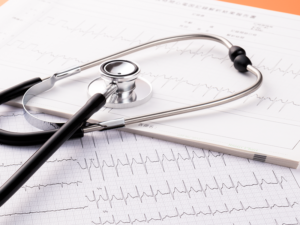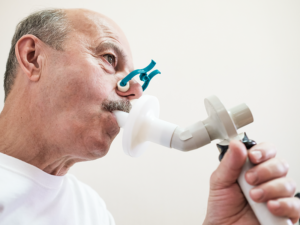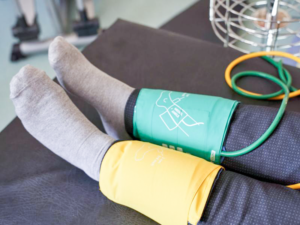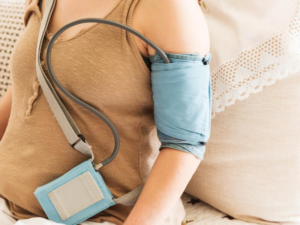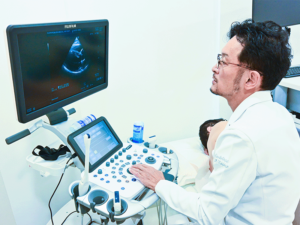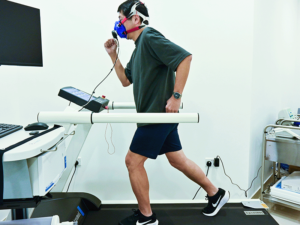Treadmill Exercise Stress Test (Exercise Electrocardiogram)
A test to evaluate heart function by recording an ECG during physical activity.
A treadmill stress test is an examination that evaluates heart function by monitoring the electrocardiogram (ECG) while you exercise.
You will walk or jog lightly on a treadmill while your heart’s electrical activity is continuously recorded.
The test typically lasts around 20 minutes.
Our experienced cardiologist and medical staff will be by your side throughout the test, so please feel free to let us know at any time if you feel short of breath or experience discomfort in your legs.
This test applies stress to the heart through exercise, allowing us to detect abnormalities that may not appear in a standard ECG.
It helps identify conditions such as myocardial infarction or angina, which involve reduced blood flow to the heart during physical activity.
The test is also useful for diagnosing arrhythmias—abnormal heart rhythms that may occur during exercise.
If you have symptoms such as palpitations, shortness of breath, chest pain, or dizziness in daily life, we recommend undergoing this test for early detection.

Detectable Conditions
Myocardial Infarction
Angina Pectoris
Arrhythmia
Important Notes
Please wear comfortable clothing suitable for exercise.
Please note that this test may not be performed in certain cases, such as during the acute phase of heart disease or in patients with severe hypertension.
Cardiopulmonary Exercise Testing (CPET)
A test that accurately measures cardiopulmonary function and endurance.
Cardiopulmonary Exercise Testing (CPET) is a test that simultaneously evaluates the function of the heart and lungs during exercise.
By wearing a special mask and exercising on a treadmill, it allows for precise measurement of cardiopulmonary performance.
The entire process, including preparation and approximately 20 minutes of exercise, takes about one hour.
This test measures cardiopulmonary function (endurance) by analyzing oxygen consumption and carbon dioxide output during exercise.
It is especially suitable for individuals who experience shortness of breath or palpitations during physical activity, as well as for evaluating the effectiveness of treatment in patients with heart or respiratory conditions.
It is also highly recommended for athletes and those in training, as it helps identify your personal cardiopulmonary limits and guides tailored training programs to improve performance.
In addition, because it promotes high fat-burning efficiency, this test is ideal for those with weight loss goals.
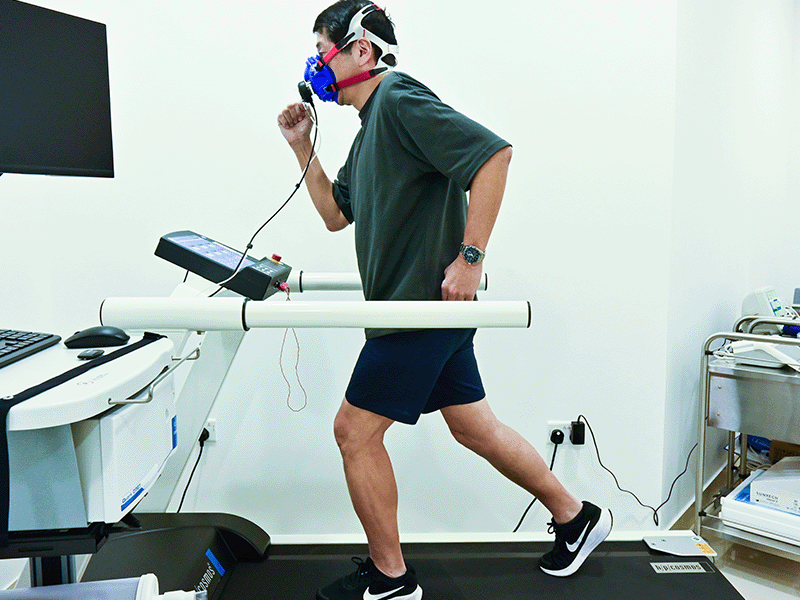
Recommended for the following individuals
- For evaluating the effectiveness of treatment in patients with heart disease
- For assessing the training impact in athletes
- For those aiming to lose weight through optimal fat-burning exercise
Important Notes
Please wear comfortable clothing suitable for exercise.
Please note that the test may not be performed in certain cases, such as during the acute phase of heart disease or in individuals with severe hypertension.
Cardiology Tests and Examinations
We offer the following diagnostic tests at our clinic.
Based on the results, we develop an appropriate treatment plan and provide referrals to specialists when necessary.
Electrocardiogram
An electrocardiogram (ECG) is a test that measures the small electrical signals generated by the heart as it beats.
This test can detect heart conditions such as myocardial infarction (heart attack), angina, arrhythmias, and cardiomyopathy at an early stage.
Pulmonary Function Test (PFT)
A pulmonary function test provides a detailed assessment of lung capacity and airway condition.
The procedure takes about 10 minutes and involves breathing deeply in and out through a mouthpiece.
It enables the early detection of respiratory diseases.
Ankle-Brachial Index (ABI)
The ABI (Ankle-Brachial Index) test is used to assess arterial narrowing and the degree of arteriosclerosis.
Blood pressure cuffs are placed on both arms and ankles to measure blood pressure, and the test takes only a few minutes.
It is useful for detecting and managing conditions that involve narrowed blood vessels.
Ambulatory Blood Pressure Monitoring (ABPM)
ABPM (Ambulatory Blood Pressure Monitoring) is a test that records your blood pressure over a 24-hour period during your normal daily activities.
A specialized monitor is worn on the arm and automatically measures your blood pressure at regular intervals.
This test is useful for detecting types of hypertension that may be missed during a standard clinic visit.
Ultrasound Examinations
There are two types of ultrasound examinations: carotid ultrasound and echocardiography.
Carotid ultrasound checks for atherosclerosis in the carotid arteries, while echocardiography observes the structure and movement of the heart in real time.
Exercise Stress Testing
A stress test is an examination that evaluates how the heart functions by measuring your electrocardiogram (ECG) during exercise.
By placing stress on the heart, this test can help detect conditions where blood flow to the heart is reduced during physical activity—such as ischemic heart disease—at an early stage.
Sleep Apnea Test
A sleep apnea test is used to detect breathing pauses and snoring during sleep.
With a simple at-home screening, we can determine whether you may have sleep apnea.
If any abnormalities are found, we will recommend appropriate treatment options to help improve your sleep quality.
Click Here to Book an Appointment
If you have any concerns about your health or oral condition,
please feel free to consult Sakura Clinic, a Japanese medical and dental clinic in Dubai.

